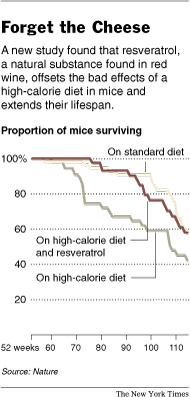 Source of graphic: online version of the NYT article cited below.
Source of graphic: online version of the NYT article cited below.
(p. A1) Can you have your cake and eat it? Is there a free lunch after all, red wine included? Researchers at the Harvard Medical School and the National Institute on Aging report that a natural substance found in red wine, known as resveratrol, offsets the bad effects of a high-calorie diet in mice and significantly extends their lifespan.
Their report, published electronically yesterday in Nature, implies that very large daily doses of resveratrol could offset the unhealthy, high-calorie diet thought to underlie the rising toll of obesity in the United States and elsewhere, if people respond to the drug as mice do.
Resveratrol is found in the skin of grapes and in red wine and is conjectured to be a partial explanation for the French paradox, the puzzling fact that people in France enjoy a high-fat diet yet suffer less heart disease than Americans.
The researchers fed one group of mice a diet in which 60 percent of calories came from fat. The diet started when the mice, all males, were a year old, which is middle-aged in mouse terms. As expected, the mice soon developed signs of impending diabetes, with grossly enlarged livers, and started to die much sooner than mice fed a standard diet.
Another group of mice was fed the identical high-fat diet but with a (p. A18) large daily dose of resveratrol (far larger than a human could get from drinking wine). The resveratrol did not stop them from putting on weight and growing as tubby as the other fat-eating mice. But it averted the high levels of glucose and insulin in the bloodstream, which are warning signs of diabetes, and it kept the mice’s livers at normal size.
Even more striking, the substance sharply extended the mice’s lifetimes. Those fed resveratrol along with the high-fat diet died many months later than the mice on high fat alone, and at the same rate as mice on a standard healthy diet. They had all the pleasures of gluttony but paid none of the price.
. . .
For the Food and Drug Administration, if for no one else, aging is not a disease and death is not an end-point. The F.D.A. will approve only drugs that treat diseases in measurable ways, so Dr. Westphal hopes to show that his sirtuin activators will improve the indicators of specific diseases, starting with diabetes.
“We think that if we can harness the benefits of caloric restriction, we wouldn’t simply have ways of making people live longer, but an entirely new therapeutic strategy to address the diseases of aging,” Dr. Guarente said.
For the full story, see:
(Note: ellipsis added.)
Here is a link to an abstract of the research report in Nature (which, by the way, is usually considered one of the top journals in science):
http://www.nature.com/nature/journal/vaop/ncurrent/abs/nature05354.html

